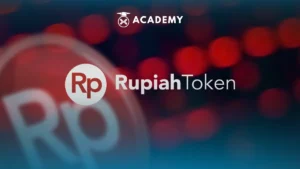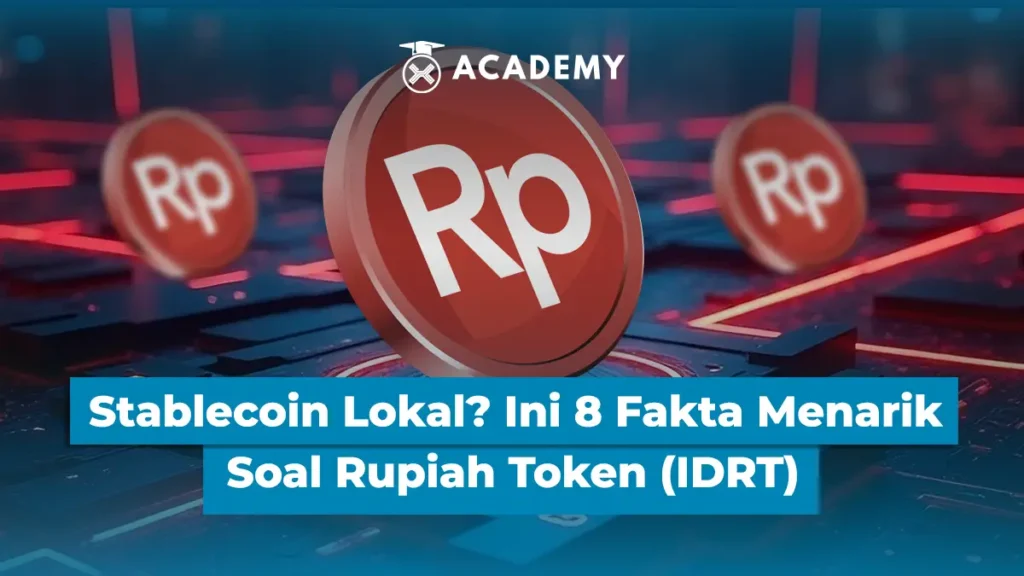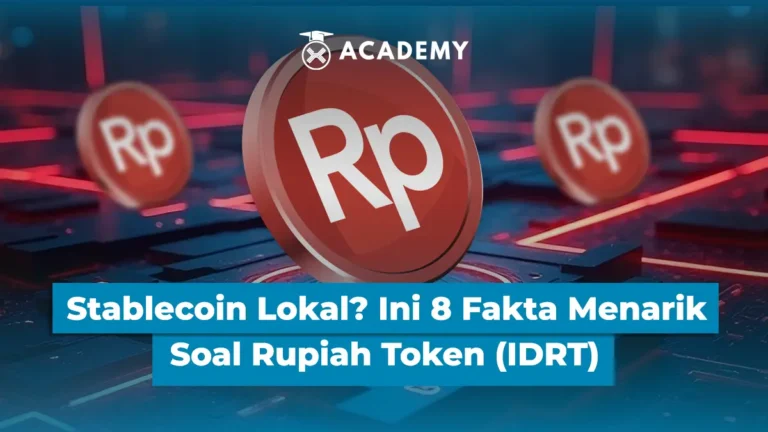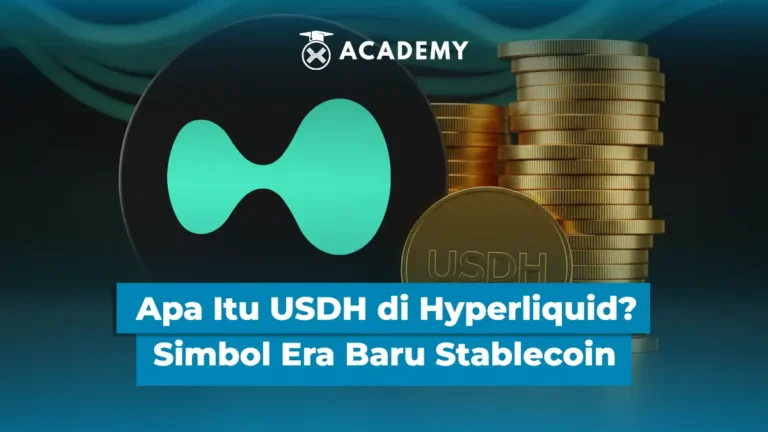Dunia kripto tak melulu soal Bitcoin yang naik-turun atau aset spekulatif yang bikin deg-degan. Di tengah volatilitas itu, muncul stablecoin, yaitu aset digital dengan nilai stabil yang jadi jembatan antara kripto dan uang nyata.
Kini, Indonesia juga punya versinya sendiri. Rupiah hadir dalam bentuk digital di blockchain, membawa semangat lokal ke ranah global.
Apa Itu Rupiah Token (IDRT)?

Rupiah Token (IDRT) is the first stablecoin from Indonesia with a 1:1 value equivalent to the Rupiah. This means that each IDRT represents one real Rupiah in the real world.
This token is issued by PT Rupiah Token Indonesia. Interestingly, IDRT is built on the Ethereum network with the ERC-20 standard, thus inheriting the speed, security, and transparency that characterize the Ethereum blockchain.
The goal is simple, yet visionary: to bring the Rupiah into the blockchain world, so it can be used for cross-platform and global transactions without losing its Indonesian identity.
Now, what makes it interesting is that IDRT is not just an ordinary token. Let’s see how its mechanism and technology work.
Interesting Facts about Rupiah Token
Now that you know what Rupiah Token (IDRT) is, it’s time to introduce you to some more interesting facts about it.
From the technology used to the blockchain ecosystem, here are the key things that make IDRT worth paying attention to:
Fact #1: The First Rupiah-Denominated Stablecoin on the Blockchain
IDRT is the first stablecoin in Indonesia to directly represent the Rupiah at a 1:1 ratio. So, 1 IDRT = 1 Rupiah, making it a real bridge between the worlds of traditional finance and blockchain.
Fact #2: Issued by an Official Indonesian Entity
This token is issued by PT Rupiah Token Indonesia. With the support of an official entity in Indonesia, IDRT demonstrates a commitment to transparency and clear governance.
Fact #3: Built on Ethereum (ERC-20)
As an ERC-20 token, IDRT leverages the speed, security, and reliability of the Ethereum network. This format also makes IDRT compatible with various global wallets like MetaMask and the vast DeFi ecosystem.
Fact #4: Can Be Used on Multiple Blockchains
In addition to the ERC-20 version on Ethereum, IDRT also exists in BEP-2 variants on Binance Chain and xDai, allowing users to transact more cost-efficiently across multiple networks. This flexibility expands IDRT’s reach in the global blockchain space.
Fact #5: Rupiah Supply and Reserves Are Publicly Traceable
Every IDRT in circulation is backed by Rupiah reserves held in partner bank accounts, and these reserve reports are publicly traceable. This transparency ensures user confidence in the stability of profits.
Fact #6: Designed for Rupiah-Based Global Transactions
Based on blockchain technology, IDRT allows users to bring Rupiah value into various global crypto ecosystems. This opens up opportunities for Indonesian users to engage in trading and DeFi without leaving their local currency identities behind.
Fact #7: Supports the DeFi and Web3 Ecosystems
IDRT has been used in various DeFi protocols such as Uniswap, allowing users to conduct digital financial activities such as staking, lending, or trading with a stable Rupiah-based value.
Fact #8: Designed to Reduce Crypto Asset Volatility
With a fixed value pegged to the Rupiah, IDRT can be a safe option for traders or investors to store value without worrying about price fluctuations, while also serving as a hedge against the dynamic crypto market.
So, from these facts, you can see that Rupiah Token is not just a local project, but part of a major step towards a more inclusive and globally connected Indonesian digital economy.
How IDRT Works on the Ethereum Blockchain
Think of IDRT as a digital version of Rupiah banknotes, securely stored in a bank vault. Every time you buy IDRT, the same amount of Rupiah is held as a reserve by its issuer, PT Rupiah Token Indonesia.
So, if there are 1,000,000 IDRT in circulation, there is also 1,000,000 real Rupiah “securing” its value in the real world.
On the Ethereum blockchain, IDRT exists as an ERC-20 token, meaning every transaction, from sending and receiving to buying and selling, is automatically and transparently recorded on the network. Everything is publicly visible, without revealing anyone’s personal identity.
In simple terms, the blockchain acts like a giant digital ledger that cannot be deleted or altered. Every IDRT transaction is recorded there, verified by the network, and accessible to anyone in real time.
This mechanism makes IDRT easily usable across various wallets, exchanges, and DeFi applications, while ensuring its value remains stable because it is directly backed by the Rupiah held.
In other words, IDRT modernizes the Rupiah, maintaining its value but making it much faster, more transparent, and more global.
Functions and Uses of Rupiah Token
Rupiah Token (IDRT) has various functions and uses relevant to users.
This token acts as a bridge between the world of digital assets and the stable value of the Rupiah. With IDRT, users can conduct global, cross-platform transactions without borders.
Rupiah value can be sent quickly and efficiently to various blockchain networks, such as Ethereum, BNB Chain, or Arbitrum, without the hassle of exchanging it into foreign currencies.
Furthermore, IDRT can also become a primary trading pair, such as BTC/IDRT or ETH/IDRT.
Its presence makes it easier for users to transact crypto assets directly using Rupiah, making the buying and selling process simpler and more transparent.
Rupiah Token also opens access to the world of decentralized finance (DeFi). Through its integration with platforms like Uniswap and Aave, IDRT can be used for various activities, such as staking, lending, and yield farming.
This provides users with the opportunity to gain additional benefits from the blockchain ecosystem.
Not only in the digital financial world, IDRT is also starting to be used for payments on various web3 platforms and merchants. This token enables fast, secure, and transparent transactions, both for purchasing digital products and everyday necessities.
Besides being practical to use, IDRT also has several advantages that make this stablecoin stand out from other tokens.
Advantages of IDRT Compared to Other Stablecoins
Rupiah Token (IDRT) has its own advantages that make it more relevant for users in Indonesia.
One of the most important is its stable value, which is directly tied to the Rupiah, not the US dollar. This means you can transact or store value in digital assets without worrying about the impact of foreign exchange fluctuations.
In terms of issuance, IDRT is also more trustworthy because it is issued by an Indonesian entity directly supervised by local authorities.
This ensures that the issuance and management processes comply with applicable domestic regulations.
Transparency is another added value of IDRT. All reserves backing this token are publicly visible through on-chain reports, so users can be confident that each IDRT has a clear backing asset.
Furthermore, IDRT is easily accessible. For users who actively trade or simply want to store assets in the form of a stablecoin, this convenience is certainly a plus.
Unlike global stablecoins like USDT or USDC, Rupiah Token offers a more local approach.
IDRT is specifically designed to meet the needs of Indonesian users, providing stability, transparency, and ease of access within a secure and trusted ecosystem.
Risks and Things to Consider

Although Rupiah Token (IDRT) offers many conveniences, users still need to understand several important things before making transactions.
One of these is the risk of using the wrong network. IDRT is available on several networks, such as ERC20 (Ethereum) and BEP2 (BNB Chain), so always ensure you send tokens to the appropriate address to avoid losing your assets.
Furthermore, it’s important to be aware of gas fees on the Ethereum network, which can fluctuate depending on market conditions. For small or frequent transactions, you may want to consider alternative, more efficient networks to keep costs under control.
Another risk arises when IDRT is used on non-Rupiah platforms. Although its value is stable against the Rupiah, there is still the potential for secondary volatility when used in ecosystems that calculate the value against the US dollar or other currencies.
Finally, it’s important for every user to understand how stablecoins work before making transactions.
By understanding their mechanisms, from asset reserves, the network used, to storage methods, you can utilize IDRT more safely and optimally.
Conclusion
So, that concludes our discussion of 8 interesting facts about Rupiah Token (IDRT), a local stablecoin. You can read more about it in the INDODAX Academy’s Crypto Academy.
In conclusion, Rupiah Token (IDRT) proves that crypto innovation isn’t always synonymous with fluctuating prices.
Its presence opens up new opportunities for users to experience the ease and speed of blockchain-based transactions without sacrificing the comfort of the Rupiah.
This isn’t just a step forward for crypto users in Indonesia, but also proof that blockchain technology can work in tandem with the local financial ecosystem.
By the way, in addition to gaining in-depth insights through various popular crypto education articles, you can also broaden your horizons through a collection of tutorials and choose from a variety of popular articles that suit your interests.
Besides updating your knowledge, you can also directly monitor digital asset prices on Indodax Market and stay up-to-date with the latest crypto news. For a more personalized trading experience, explore Indodax’s OTC trading service. Don’t forget to activate notifications so you don’t miss out on important information about blockchain, crypto assets, and other trading opportunities.
You can also follow our latest news via Google News for faster and more reliable access to information. For an easy and secure trading experience, download the best crypto app from INDODAX on the App Store or Google Play Store.
Maximize your crypto assets with the INDODAX Earn feature, a practical way to earn passive income from your stored assets. Register now with INDODAX and easily complete KYC to start trading crypto more safely, conveniently, and reliably!
Indodax Official Contact
Customer Service Number: (021) 5065 8888 | Support Email: [email protected]
Also follow us on social media here: Instagram, X, Youtube & Telegram
FAQ
1.What is Rupiah Token (IDRT)?
IDRT is an Ethereum-based stablecoin with a 1:1 value equivalent to the Indonesian Rupiah.
2.Who is the issuer of Rupiah Token?
Issued by PT Rupiah Token Indonesia
3.What is the difference between IDRT ERC20 and BEP2?
ERC20 runs on Ethereum (ETH gas fee), while BEP2 runs on Binance Chain (BNB fee).
4.Can IDRT be stored on Metamask?
Yes, as long as you choose the Ethereum network and add the official IDRT contract address.
Author: Boy






 Polkadot 9.00%
Polkadot 9.00%
 BNB 0.60%
BNB 0.60%
 Solana 4.85%
Solana 4.85%
 Ethereum 2.37%
Ethereum 2.37%
 Cardano 1.63%
Cardano 1.63%
 Polygon Ecosystem Token 2.14%
Polygon Ecosystem Token 2.14%
 Tron 2.86%
Tron 2.86%
 Market
Market


